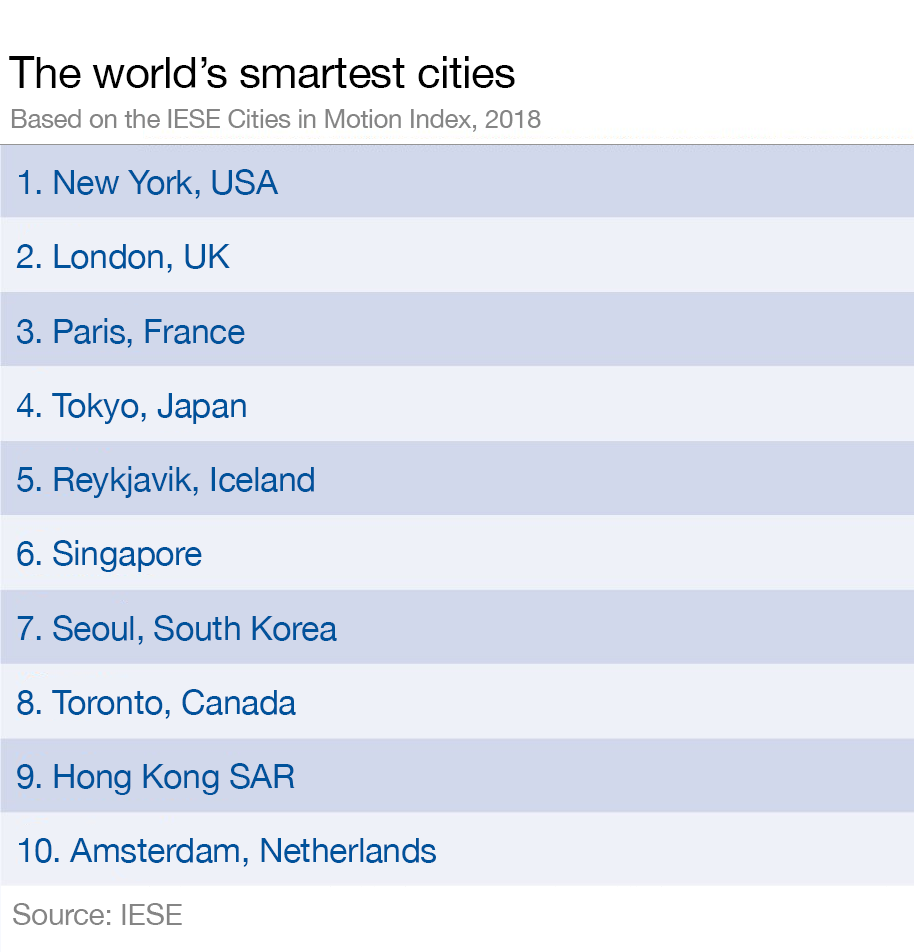These are the world's smartest cities in 2018

Seoul ranked as the 7th smartest city in the world. Image: REUTERS/Lee Jae-Won

Get involved with our crowdsourced digital platform to deliver impact at scale
Stay up to date:
Cities and Urbanization
For the second year in a row, New York has been declared the smartest city in the world, according to the IESE Cities in Motion Index. London and Paris also maintain their positions just behind the big apple, taking the second and third spots respectively.


The top-10 list is completed by Tokyo (4), Reykjavik (5), Singapore (6), Seoul (7), Toronto (8), Hong Kong (9) and Amsterdam (10.) Europe, with 12 cities ranking among the top 25, is once again the top-performing geographical area. It is followed by North America, with six; Asia, with four (all in the top 10); and Oceania, with three.
What is a smart city?
This fifth edition of the index analyzes the level of development of 165 cities from 80 countries, across nine dimensions considered key to being a smart, sustainable city: human capital (developing, attracting and nurturing talent), social cohesion (consensus among the different social groups in a city), economy, environment, governance, urban planning, international outreach, technology, and mobility and transportation (ease of movement and access to public services). The index is prepared by IESE Business School's Center for Globalization and Strategyunder the direction of professors Pascual Berrone and Joan Enric Ricart.
While most smart cities rankings are focused solely on the use of smart technology or specific measures of environmental sustainability, to perform well on this index a city must perform well across a number of different elements. After all, it is not much good having an environmentally friendly city if crime & unemployment is so high no one wants to live there.
Here New York, London and Paris have done well because all three score highly across nearly all the criteria used in the index. New York is in first place overall due to its position as the world’s most important economic center, ranking first in this dimension, and is also top for urban planning. London, in second place, is best for human capital thanks to its high numbers of quality business schools and universities. Meanwhile Paris, the city with the second-highest number of international tourists, is first for international outreach and first for Mobility and Transportation, thanks to its metro system, bike sharing system and high-speed trains.
However, all three cities are still grappling with the issue of social cohesion and place in the bottom of the ranking on this measure. This reflects the fact that many cities that have high economic levels (in average terms), at the same time are more inequitable and unequal, which can lead to problems between different strata in society. According to the report´s authors, “One of the greatest challenges for cities is to transform themselves into urban centers that are simultaneously prosperous, equitable and inclusive.”
Clearly striking a balance in the various areas where success is measured is a complex, ongoing process that requires an overall vision. It is not enough to excel in one area -- as is the case with Montevideo, Bangkok, Kiev and Doha, all located in the bottom half of the ranking -- since this produces "unbalanced" cities. Indeed, only a select group of cities -- such as Amsterdam, Seoul and Melbourne -- do moderately well in all dimensions. And it is difficult to combine certain dimensions -- namely, economic power with social cohesion as well as mobility/transportation with the environment.
About the ranking
The ranking aims to be a tool for mayors, city managers, companies and interest groups that want to improve the quality of life of city residents. Studying the most advanced cities in each category provides a source of inspiration to identify best practices for more innovation, sustainability, equity and connectedness.
The fifth edition presents some important updates with respect to the previous years: the number of indicators used has been significantly increased and the analysis has been enriched with new data -- such as the number of terrorist attacks, the compliance levels of ISO 37120 (known as the smart city standard), and even prospective variables, such as GDP per capita projections and rising temperatures.
Don't miss any update on this topic
Create a free account and access your personalized content collection with our latest publications and analyses.
License and Republishing
World Economic Forum articles may be republished in accordance with the Creative Commons Attribution-NonCommercial-NoDerivatives 4.0 International Public License, and in accordance with our Terms of Use.
The views expressed in this article are those of the author alone and not the World Economic Forum.
The Agenda Weekly
A weekly update of the most important issues driving the global agenda
You can unsubscribe at any time using the link in our emails. For more details, review our privacy policy.
More on Urban TransformationSee all
Victoria Masterson
April 17, 2024
Fatemeh Aminpour, Ilan Katz and Jennifer Skattebol
April 15, 2024
Victoria Masterson
April 12, 2024
Victoria Masterson
April 11, 2024
Arama Kukutai
April 10, 2024







